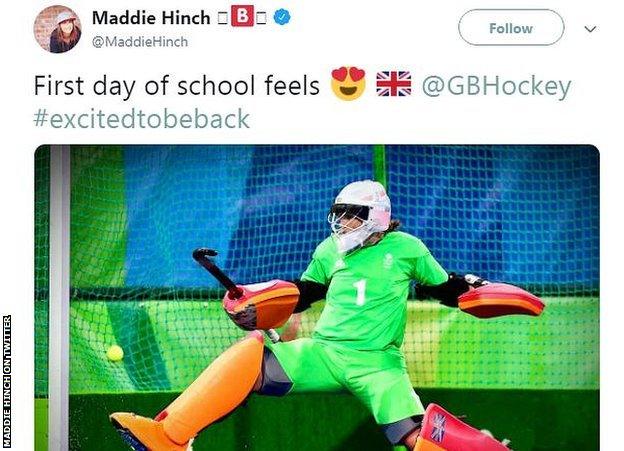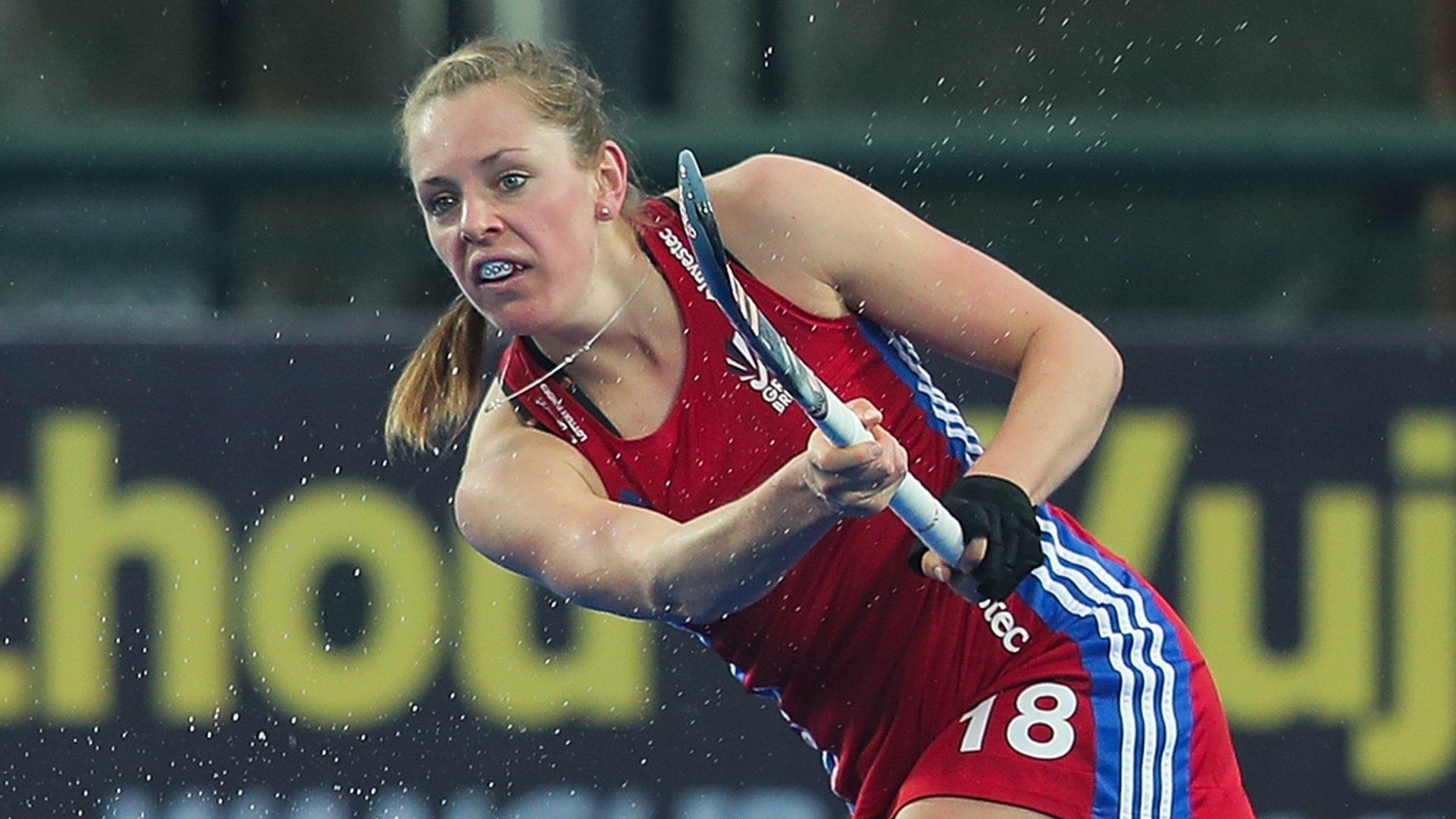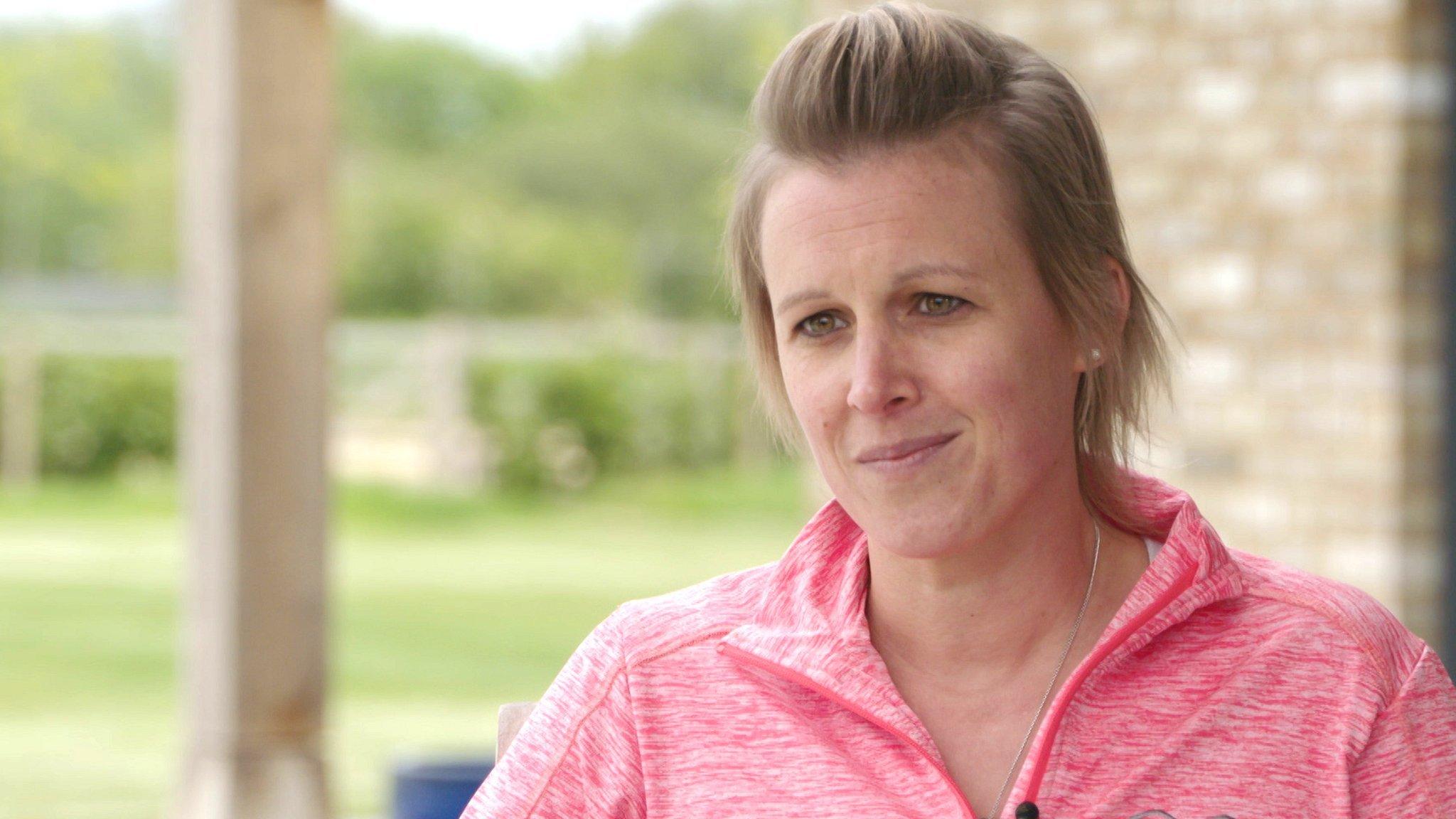Maddie Hinch needed break from international hockey after Rio 2016 gold
- Published
I have more experience now - Maddie Hinch
Olympic gold medallist Maddie Hinch says the pressure to always put in a "superhuman performance" was why she stepped away from international hockey after last year's World Cup.
Goalkeeper Hinch played a pivotal role in Great Britain's first women's hockey Olympic gold at Rio 2016.
The 30-year-old is set to play her first GB match in nine months on Friday and wants to do things differently.
"I was trying so hard to live up to the expectation after Rio," said Hinch.
"We were thrown into a situation where it had gone from people not knowing your name to stopping you in the street. It was so unusual.
"You want to continue to please those people but it's not about them.
"I needed some time to work out how I'm going to carry that expectation and deal with that. This time has allowed me to work that out."
Hinch kept out all four Netherlands attempts in the shootout to decide the 2016 Olympic final, as Britain won it 2-0 after a thrilling 3-3 draw.
She has played 133 times for England and GB since making her international debut in 2008, aged 19.
"It took a while to get to the point where I started to miss it. I watched a few games and all of a sudden I wanted to be there," she told BBC Sport.
"Everything had been a bit of a slog and had gone stale for me. I'd lost my love for the game so as soon as I started getting butterflies putting my pads on, I knew I was ready."

Hinch returned to training with the Great Britain team on Tuesday
'Oh, now you show up'
The Rio final was watched by 9.7 million people on the BBC and Hinch was celebrated afterwards on social media.
Seven of the 16 players who won gold have now retired and GB's women have been struggling for wins, sitting seventh in the Pro League with little chance of qualifying for the semi-finals at the end of June.
Hinch says this contrast can be hard to handle and that the timing of her return has met with some mockery from her team-mates.
"Everyone was taking the mickey a bit at my first training session back," she explained. "They were saying, 'Oh, now you show up'. It's fair, I deserve it.
"But it was nice to be there and once I'd settled into the first session and the nerves had settled a bit, it felt like I'd never left.
"To go from such extremes post-Rio to a difficult transitional phase was tough. It's not just myself that felt that, it was a lot of the Rio players.
"When you get a taste of those finals, it's something that you want so much. It's hard to find yourself losing games, playing for fifth or sixth place.
"But from the moment I gave the news around my break to the moment they heard I was coming back, they've been incredibly supportive which has made the whole thing a lot easier."
'A different role to play'
Despite Britain struggling for results after Rio, Hinch remains a world-renowned goalkeeper, winning FIH goalkeeper of the year in 2016, 2017 and 2018.
She has been playing for SCHC Bilthoven in the Netherlands for the past three years, but left when she decided to return to international hockey.
Hinch's last international appearance was at the 2018 World Cup in London, where England lost to the Netherlands in the quarter-finals.
She will compete with Amy Tennant for a place in Britain's starting line-up to face Germany in the Pro League on Friday, before GB face Australia on Sunday.
Their final game before the Pro League semi-finals will take place at rugby side Harlequins' ground Twickenham Stoop on 23 June and, as the side goes through a transitional phase under new coach Mark Hager, Hinch has valuable experience to offer in all these fixtures.
She says stepping up as one of the side's leaders "will challenge her every day".
"The role I have to play in this team is different to when I started aged 20," she added.
"I'm much older, more experienced. I have more of a voice. The girls look for me to give them an opinion and to challenge them in training. That's not something I ever really did.
"It's not something that has been natural to me but I now like the opportunity to be able to do that.
"I definitely think the experience is welcomed back."
'Anything can happen in Tokyo'
GB women lose to Argentina in shootout
Hinch will hope she can help GB turn their fortunes around before defending their Olympic title at Tokyo 2020.
But the side need to secure Olympic qualification first, with qualifiers taking place in October or November.
If they do get to Japan, Hinch says that their performance in 2016 demonstrated anything can happen on the Olympic stage.
"We were a team ranked seventh in the world going into Rio," she said. "We finished second to bottom in the tournament that took place previous to it.
"No-one should underestimate anyone. If we go into the tournament one of the lower-ranked teams, people should still back us to go on and achieve something. Sport can do strange things.
"Fingers crossed, who knows what could happen?"
BBC Sport has launched #ChangeTheGame this summer to showcase female athletes in a way they never have been before. Through more live women's sport available to watch across the BBC this summer, complemented by our journalism, we are aiming to turn up the volume on women's sport and alter perceptions. Find out more here.
- Published29 June 2019

- Published24 May 2019
